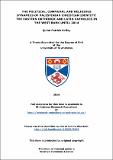Files in this item
The political, communal and religious dynamics of Palestinian Christian identity : the Eastern Orthodox and Latin Catholics in the West Bank
Item metadata
| dc.contributor.advisor | McCallum, Fiona | |
| dc.contributor.advisor | Lang, Anthony F. | |
| dc.contributor.author | Coffey, Quinn | |
| dc.coverage.spatial | 233 p. | en_US |
| dc.date.accessioned | 2016-10-03T14:18:20Z | |
| dc.date.available | 2016-10-03T14:18:20Z | |
| dc.date.issued | 2016-11 | |
| dc.identifier | uk.bl.ethos.694561 | |
| dc.identifier.uri | https://hdl.handle.net/10023/9598 | |
| dc.description.abstract | Despite the increasingly common situation of statelessness in the contemporary Middle East, a majority of the theoretical tools used to study nationalism are contingent upon the existence of a sovereign state. As such, they are unable to fully explain the mechanisms of national identity, political participation, and integration in non-institutional contexts, where other social identities continue to play a significant political role. In these contexts, the position of demographic minorities in society is significant, as actors with the most popular support –majorities -- tend to have the strongest impact on the shape of the political field. This thesis demonstrates what we can learn from studying the mechanisms of nationalism and political participation for one such minority group, the Palestinian Christians, particularly with regards to how national identity fails or succeeds in instilling attachment to the state and society. This is accomplished by applying the theoretical framework of social identity theory to empirical field research conducted in the West Bank in 2014, combined with an analysis of election and survey data. It is argued that the level of attachment individuals feel towards the “state” or confessional communities is dependent on the psychological or material utility gained from group membership. If individuals feel alienated from the national identity, they are more likely to identify with their confessional community. If they are alienated from both, then they are far likelier to emigrate. Additionally, I suggest that the way in which national identity is negotiated in a stateless context is important to future state building efforts, as previous attempts to integrate national minorities into the political system through, e.g., devolved parliaments and quotas, have failed to instil a universal sense of the nation. | en_US |
| dc.language.iso | en | en_US |
| dc.publisher | University of St Andrews | |
| dc.rights | Creative Commons Attribution-NonCommercial-NoDerivatives 4.0 International | |
| dc.rights.uri | http://creativecommons.org/licenses/by-nc-nd/4.0/ | |
| dc.subject | Palestine | en_US |
| dc.subject | Christianity | en_US |
| dc.subject | Minority | en_US |
| dc.subject | Arab Israeli Conflict | en_US |
| dc.subject | Integration | en_US |
| dc.subject | Political participation | en_US |
| dc.subject | Citizenship | en_US |
| dc.subject | Orthodox | en_US |
| dc.subject | Catholic | en_US |
| dc.subject | Identity | en_US |
| dc.subject | Communalism | en_US |
| dc.subject | Sectarianism | en_US |
| dc.subject | Equal rights | en_US |
| dc.subject | Religion | en_US |
| dc.subject | Liberal peace | en_US |
| dc.subject | Hybrid peace | en_US |
| dc.subject.lcc | BR1107.C7 | |
| dc.subject.lcsh | Christians--West Bank | en_US |
| dc.subject.lcsh | Orthodox Eastern Church members--West Bank--Political activity | en_US |
| dc.subject.lcsh | Catholics--West Bank--Political activity | en_US |
| dc.subject.lcsh | Nationalism--West Bank | en_US |
| dc.subject.lcsh | Group identity--West Bank | en_US |
| dc.title | The political, communal and religious dynamics of Palestinian Christian identity : the Eastern Orthodox and Latin Catholics in the West Bank | en_US |
| dc.type | Thesis | en_US |
| dc.contributor.sponsor | Russell Trust | en_US |
| dc.type.qualificationlevel | Doctoral | en_US |
| dc.type.qualificationname | PhD Doctor of Philosophy | en_US |
| dc.publisher.institution | The University of St Andrews | en_US |
The following licence files are associated with this item:
This item appears in the following Collection(s)
Except where otherwise noted within the work, this item's licence for re-use is described as Creative Commons Attribution-NonCommercial-NoDerivatives 4.0 International
Items in the St Andrews Research Repository are protected by copyright, with all rights reserved, unless otherwise indicated.


